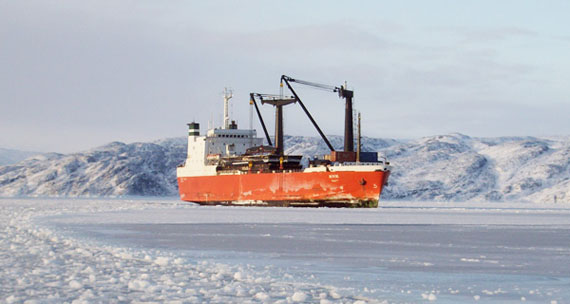Shipping firms say a heavy fuel oil ban would raise costs for Nunavut
CAMBRIDGE BAY — Efforts to reduce and eventually ban the use of heavy fuel oil by Arctic vessels, proposed by Canada and the United Nations agency responsible for shipping and prevention of marine pollution, will increase the cost of living in Nunavut, two regional Arctic shipping companies said last week.
A ban on the fuel, usually referred to as HFO, could add roughly $1 million to the cost of sealift in the Kitikmeot region, Mark Bray, the vice president of sales and marketing at Nunavut Eastern Arctic Shipping Inc., told the region’s mayors and senior administrators who met last week in Cambridge Bay.

“It will have an effect. There is no doubt,” Bray told hamlet officials, who are already looking for ways to reduce their annual supply costs and lower the price of expensive food in their communities.
A ban on HFO comes as shipping companies also face a new carbon tax on vessel emissions that comes into force Jan. 1, 2018.
Francois Gaudreau of Nunavut Sealink and Supply Inc., who also spoke to the gathering, said his company is still evaluating the impact of such a ban on sealift costs.
But “NSSI will not absorb the full cost increase resulting of this regulation,” he said in a later email.
“NSSI will most likely, in the near future, include a provision in contracts that allows the carrier the right to adjust the rates when governments impose additional costs to sealift operations.”
Gaudreau said that shipping is “by far the greenest of all modes of transportation.”
Canadian Arctic resupply ships, vessels servicing mine sites and most of the large passenger ships use HFO, which has been called “the world’s dirtiest fuel.”
Much of the soot generated from exhaust produced by slow-burning HFOs and other sources has a powerful impact in the Arctic, where its black particles, which soak up and magnify heat, are believed to be responsible for at least 30 percent of warming in the Arctic.
Research has shown that reducing soot emissions could cool the Arctic faster and more economically than any other quick fix.
And if it’s ever spilled in cold waters, HFO would be impossible to clean up, critics say, which is why HFO has been banned in the Antarctic since 2011.
In December 2016, Canada and the United States announced a joint “phase down” of HFO from their respective Arctic regions and looked to the International Maritime Organization for regulation.
The IMO accepted their report this past July and plans to consider it further in April.
But already the pressure is increasing for a ban of HFOs.
This including a new “Our Ocean Arctic Commitment,” launched by the Clean Air Alliance Oct. 6 in Malta.
That follows its January 2017 launch of the “Arctic Commitment,” signed by more than 50 Arctic companies, polar explorers, indigenous groups, NGOs and officials.
The Our Ocean Arctic Commitment aims, among other things, to:
• provide information on the availability of innovative technologies that could replace HFO;
• show that abandoning the use of HFO in the Arctic is feasible; and,
• prepare an “Arctic Commitment” report highlighting signatories, and “words of wisdom” from a selection of Arctic voices.